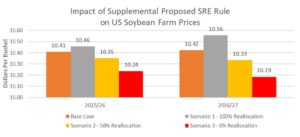 Renewable Fuels Association President and CEO Geoff Cooper offered the opening keynote address Monday morning at the Global Ethanol Summit in Washington, taking a look at ethanol’s future by way of its past.
Renewable Fuels Association President and CEO Geoff Cooper offered the opening keynote address Monday morning at the Global Ethanol Summit in Washington, taking a look at ethanol’s future by way of its past.
“It’s a real privilege for me to start today’s program by sharing the U.S. ethanol industry’s history, our story, and our experience,” he said. “How did we get here? How did the U.S. become the world leader in ethanol production and consumption? How did ethanol evolve into a crucial driver of energy security and rural prosperity in the United States?”
Cooper emphasized how the drivers of ethanol’s incredible growth trajectory over the past four and a half decades are still vital for the decades ahead: smart public policy, innovation and continuous improvement in the industry itself, and the fact that ethanol is a product with many uses and benefits.
With regard to policy, Cooper stressed the industry’s broad, bipartisan support. “Throughout our industry’s history, we have been fortunate to have legislators—at both the state and federal level—along with presidents and governors, who have clearly understood the many benefits of renewable fuels. We’ve also been lucky to have so many highly effective advocates from our industry and strong partnerships with the nation’s leading farm organizations. … And in every case, the policies that have driven growth in ethanol production and use are policies that were explicitly designed to solve the problems and challenges facing American families across the country.”
RFA General Counsel and VP, Government Affairs Ed Hubbard emceed the Monday afternoon panels, including a discussion on Leveraging Regenerative Agriculture for Ethanol Opportunities, and will kick off Tuesday morning’s discussions featuring innovation and emerging markets, vehicle compatibility, and marine fuel.
The summit this week is bringing together top policymakers, industry leaders, researchers, and trade
stakeholders to advocate for the value of U.S. ethanol in various sectors—including on-road, sustainable aviation fuel (SAF), industrial applications, clean cooking, and sustainable marine fuels (SMF).
 The latest EIA data analyzed by the Renewable Fuels Association shows an increase in ethanol production and exports and a decrease in stocks.
The latest EIA data analyzed by the Renewable Fuels Association shows an increase in ethanol production and exports and a decrease in stocks.











